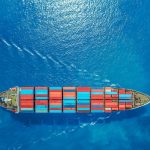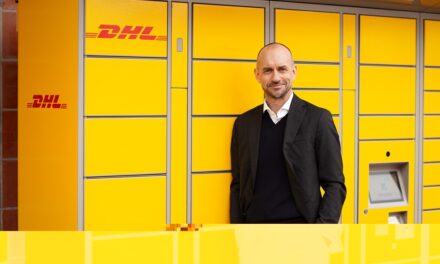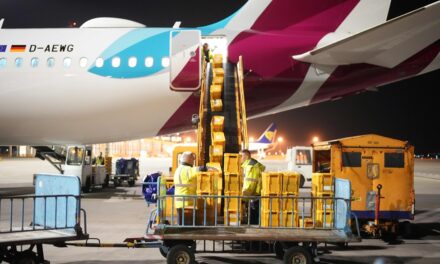
DP DHL “strong” with net profit of EUR 1.7bn
Deutsche Post DHL said it made a strong start to 2010 after revealing its Q1 results – and a net profit of EUR 1.7bn. The Group concluded the first quarter of fiscal year 2010 with an increase in revenues and a strong rise in earnings. Buoyed by the continuing recovery of the world economy and rising transport volumes, consolidated revenue climbed 4.4% to EUR 12bn compared with the same period last year. These solid results were fueled by substantial growth in DHL, a development that was also driven by increasing business with important new customers. Bolstered by the successful efficiency measures initiated last year, the Group’s underlying EBIT improved by 81.4% to EUR 566m.
The company announced that underlying EBIT is expected to finish the year at the upper end of the forecast range of EUR 1.6bn to EUR 1.9bn
CEO Frank Appel said: “We have broadly improved our performance. Our first quarter results demonstrate clearly that we are well prepared for the future: we have broadly improved our performance,” said Frank Appel, the CEO of Deutsche Post DHL. “But there is much more to accomplish. We will continue to press forward with the implementation of our Strategy 2015 and unlock the Group’s full potential step by step.”
Efficiency gains also played a major role in the Group’s consolidated net profit, enabling Deutsche Post DHL to significantly improve its profitability: The net profit totaled EUR 1.7bn in the first quarter of 2010, compared with EUR 944m in the same period last year. Both figures include significant positive effects from the first-time mark-to-market valuation of financial instruments related to the Postbank sale.
Reported EBIT climbed from EUR 27m in the first three months of 2009 to EUR 512m in 2010. In addition to operating gains, this performance reflected the expected significant reduction in non-recurring expenses. The Group’s net financial income more than doubled during the first quarter, jumping from EUR 618m in the same period last year to EUR 1.3bn. This includes positive effects of around EUR 1.4bn from the first-time mark-to-market valuation of financial instruments related to the Postbank sale. In the previous year, income from the valuation of derivatives related to the Postbank sale totalled EUR 737m. The consolidated net profit after minorities climbed 85.1% to EUR 1.7bn. This amounts to an improvement in earnings per share to EUR 1.44 (2009: EUR 0.78).
The Group’s capital expenditures totalled EUR 195m in the first quarter of 2010, 19.1% below the previous year’s level. The Board of Management remains committed to the slight increase in capital expenditure to EUR 1.4bn as planned for the entire year. During the first quarter, operating cash flow is regularly impacted by the annual payment made to the Bundes-Pensions-Service für Post und Telekommunikation, a special pension fund for the company’s civil servants, which is paid annually in January of each year. This payment resulted in a net cash outflow of EUR 556m during the first quarter.
Total net cash used in operating activities fell considerably to EUR 95m (2009: minus EUR 275m). Free cash flow increased by EUR 1.1bn compared to the previous year totalling minus 290m EUR in the first quarter of 2010. In addition to the improved operational performance, this development mainly reflects the investment of cash proceeds from the Postbank transaction in various financial instruments during the first quarter of 2009. Net liquidity fell slightly to EUR 1.4bn compared to the 2009 year-end level of EUR 1.7bn.
“Our financial position is very solid – and we expect it to remain so in the future,” CFO Larry Rosen declared. “This will be a result of our underlying business performance and the financial strategy we adopted in March 2010. This strategy will continue to play a critical role in safeguarding financial stability and flexibility as well as securing low capital costs for the Group.”
For full-year 2010, the Group expects a continued recovery in global transport volumes. Deutsche Post DHL confirmed its guidance of underlying EBIT between EUR 1.6bn and EUR 1.9bn. Driven by the overall solid performance in the first quarter, the Board of Management assumes that the result for the full year will be at the upper end of this range. It is believed today that the DHL division and the MAIL division will contribute roughly the same amount to earnings for the first time. While earnings at the MAIL division are expected to total between EUR 1.0bn and EUR 1.2bn, the projected amount for DHL is between EUR 1.0bn and EUR 1.1bn. Consolidated net profit is expected to continue to improve in 2010 in line with the Group’s operating business. Furthermore, the company anticipates that the positive net earnings trend will sustain in 2011.
“The encouraging start to the new year confirms our fundamental optimism about 2010,” Rosen said. “In the future, our goal is to achieve a stable result in the MAIL division and for DHL to become the driving force of growth in consolidated net profit. Even though we continue to face economic, political and regulatory uncertainties, we are increasingly optimistic about the future.”
In the first three months of 2010, revenue in the MAIL division totalled EUR 3.4bn, nearly the same level as the previous year (2009: EUR 3.5bn). While the phase of crisis-related reductions seems to be largely over, the trend towards the increased substitution of physical letters with electronic media in the traditional mail business remained unchanged at the beginning of 2010. By contrast, the PARCEL Germany business unit performed dynamically, with powerful growth in internet retail propelling revenue well above the previous year’s total.
At EUR 390m, the division’s underlying EBIT for the first quarter finished 4.2% below the previous year’s level of EUR 407m. As a result of strict cost discipline, the slight reduction in revenue as well as wage increases could be largely offset.
In the first quarter, the EXPRESS division performed particularly well. Revenue in the first three months of 2010 jumped by 9.0% to EUR 2.6bn (2009: EUR 2.4bn). The main reasons for this growth were the marked increase in daily shipping volume – particularly time-definite international shipments – and higher fuel-surcharge revenues. The EXPRESS business in the Americas and Asia-Pacific regions was particularly strong. Adjusted for exchange-rate effects, organic growth of 16.1% and 19.3% respectively was generated in these regions.
The division’s EBIT also improved strongly during the reporting period. For the same period in the previous year, a loss before non-recurring items of EUR 120m was incurred. During the first three months of 2010, an underlying profit of EUR 154m was generated. In addition to the positive momentum resulting from the economic recovery, the completion of the restructuring program in the United States as well as significant cost reductions worldwide contributed to the result.
In the GLOBAL FORWARDING, FREIGHT division, the increase in volumes seen since the second half of 2009 accelerated in the first quarter of 2010. Volumes for both air and ocean freight rose sharply during the first three months compared with the previous year’s level. This is the result of DHL attracting important new customers in addition to the economic upswing. As a result, the division boosted its first quarter revenues to EUR 3.1bn, a 13.5% increase from the total of EUR 2.7bn generated in the same period in 2009.
Because demand is rapidly rising following the economic crisis, transport rates for air and ocean freight capacities have risen considerably. DHL did indeed secure additional capacities at an early stage. But the higher prices could not be completely passed on to customers. However, as a result of the division’s successful push to cut operating and indirect costs through intensive cost management, underlying EBIT rose by 8.0% from EUR 50m in 2009 to EUR 54m in the first quarter of 2010.
Revenue in the SUPPLY CHAIN division declined slightly during the first quarter of 2010. At EUR 3.1bn, it was 0.5% below the level from the same quarter in 2009. This drop largely resulted from the loss of business caused by the bankruptcy of the Arcandor Group in Germany and an underperforming contract in the United States that was not renewed in the second quarter of 2009. But in most regions and sectors, revenue trends were positive. New business wins and trading upturns generated strong growth particularly in the Asia-Pacific region. During the first quarter of 2010, additional contracts with new and existing customers that totaled about EUR 240m were concluded. Thanks to improvements in margins produced by successful cost cutting, underlying EBIT jumped by 52.4% to EUR 64m (2009: EUR 42m).













